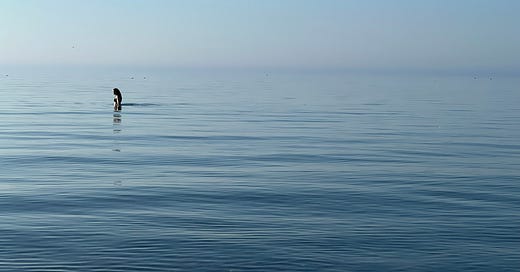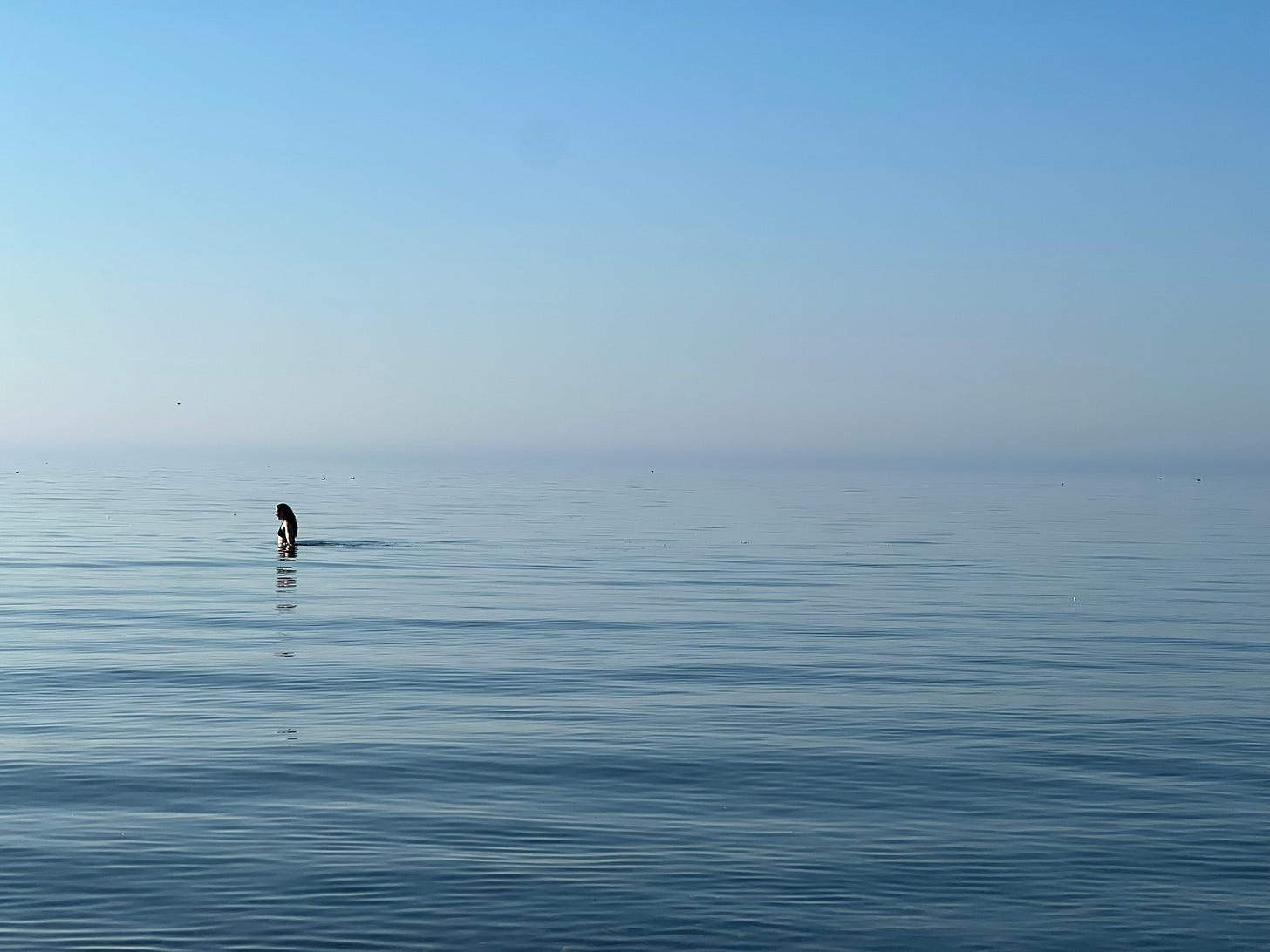Whenever it is remotely feasible to do so, I take myself to water. I am still hoping for a flash of recognition, for my fur to flush to life like a tide pool filled in, like the day after a sunburn or a slap, like an apology blooming into silence. I am hoping history is right about thalassotherapy and sea air and selkies reviving; that the viral cold plunge and the open water swimming treatments patients recommend each other in lieu of fulsome medical care have some scientific truth. I am hoping I can somehow absorb my cardiology-recommended high salt dosage through the skin and lungs instead of eating the pickled herring and smoked fish of my seaside ancestors.
Before I got sick, there was no difference for me between at or in water: the former implied the latter like a shadow. I threw myself in rivers and lakes regardless of temperature or whether anyone thought it was a reasonable time of year to break the surface tension. But illness took my swimming breath away, calcified my lungs, broke the neural connection between intention and movement, the cellular mechanisms to oxygenate and repair muscles in motion, and temperature regulation even at rest.
Early in dating, my girlfriend told me that my expectations of relationships were hot water in a rental unit: below the legal definition of habitable. She could not offer me a house but she wanted me to make myself at home in hers, to sleep like the bedside wasn’t full of someone else’s water glasses. She never much liked swimming but she liked watching me show off my cold tolerance, preferring the chlorine clean of pools or her own rain-shower over the silt and risk of open water. Often, I’d arrive in town to find her still steaming in the bathroom, embroiled in what her wife jokingly called “girlfriend preparations”: the labour of desirability performed for lovers who could leave easily.
In illness, I lose capacity to cope with any precarity other than my own malfunctioning body: every alarm, every tripwire, every flashing ‘check-me’ light on my internal dashboard goes off daily like Christmas in the ICU. Most intertidal creatures are adapted to daily fluctuations: heat, oxygen, salinity, depth, and predators. But this illness is itself an unbalancing, an incoherence of bloody salt and water, copper and zinc, calcium and magnesium, aldosterone and renin, systolic and diastolic, SNS and ANS, agonist and antagonist. I am unable to bathe myself or to find equilibrium in a body that cannot stay conscious in a hot shower long enough to untangle my algae hair.
The whole nervous system runs on sodium: voltage-gated channels conducting ions triggering action potentials, discharging neurotransmitters from synapses — the gap across which neurons talk. Too much neural gossip and the body makes seizures and disturbed sleep, clutches the heart like pearls; too little and the whole grid shuts down in protest. For months, I wake weather-moody and glass-eyed with my heart glitching painfully, my body unable to retain enough salt to keep my blood volume up, my blood-brain barrier slit clean open like fish. I collapse mid-way through arguments and off-camera on zoom calls, malfunctioning physiologically under stress of any kind. When my girlfriend leaves me suddenly, I sleep like a slapstick movie, a failure to play dead, my body waiting up to catch her mistake. My cardiologist tells me to quit my job, to avoid conflict, to watch and read nothing but predictably soothing reruns until my heart stops literally breaking in ways science doesn’t yet know how to treat.
Instead I go swimming. In lakes so big their duplicitous horizons are a wink of waterline, every sand dune a false bottom, I lie on my back and let the ebb and flood beat a metronome of balance back into my body. In a gorge where reforested oysters spit clean water through closed teeth, transmute discomfort into productive coughs, nitrogen into stiffer skin, I swim short laps with and against the tide, water-weighted for the betterment of bones and muscle. At my local pool I wonder, in a uniquely mid-pandemic weighing of risks, if chlorine kills air-borne viruses, if it is safer to breathe underwater.
Later, my girlfriend’s wife will tell me that all of this happened because I was not a wife: in sickness and health does not apply in love unmoored by law or sheltered by shared home. We are in a pandemic in which the household is the salient measure bounding one’s responsibility and care is a scarce resource distributable in two-week chunks — the time needed to clear the virus before breathing air with someone new. It is not the same as cancer, she’ll say, it is not the same as marriage. A drowning woman could take anyone down with her.
Photo credit: Elif Giray




"At my local pool I wonder, in a uniquely mid-pandemic weighing of risks, if chlorine kills air-borne viruses, if it is safer to breathe underwater." Oof.
I haven't been back to a pool yet since the pandemic started but I want to so badly.
Wow. Incredible writing - I feel such a visceral connection to this. Thank you.